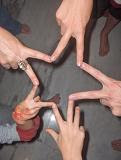
^ Click for a better view on this, it is a banner from the internet. For those of you who are technical, most websites evaluate my IP address and find it in a range that ties back to India. Therefore, I get shown Indian advertisements in the place where you would see an American one. This was in Yahoo! Mail up at the top of the page.
____________________________________________________________________
About 95% of marriages in India are arranged. Hindus do it, Muslims do it, Christians do it - in short, just about everyone does it. It is not like you think - the young people do have a choice, but the choice is limited by the people their family will engage with. Caste, religion, color, affluence, and a huge variety of other factors come into play for Hindus - but the major factor is astrological, where a priest chooses based upon stars, planets, and other such factors.
For most everyone else, it is the same considerations, stripped of the astrology. Now, a Sunni would be expected to marry another Sunni, and a Christian a Christian, etc. In that way, religion is a caste, you could say.
The major method for managing these is through online websites, newspapers, and for the poor, word of mouth. But there is always a system.
When a family chooses a potential spouse for their child, they hold a party of sorts where banter and food flow freely, and then eventually the young person from the hosting family comes out to meet their potential partner. They chat, check each other out, and when the party is over, they would tell their family if they want a second visit.
On several levels, this system offends the American mind. And astrology being in play cannot connect with Christian faith. We believe people should have freedom to choose their spouse. We think of this arrangement process as rather backward, but in reality, it - like India itself - seems to work in spite of itself. Even if we cannot make sense of it, it results in dedicated, loving marriages in many cases (but not all) and the rate of divorce in India is a fraction of what it is in the US. Not that I am an advocate of the practice, but I see that a society where families are extended, groups are clearly defined and kept separate in many ways, and people marry when relatively young - I can see why the society doesn't leave the decision of a lifetime to a 22 year old to make on his or her own.
Again, I understand it, but I don't embrace it. I am a product of my culture, as well. I tend to think - How could one let a decision of a lifetime be left to someone else?
Here is a typical matrimonial advertisement's wording:
Ezhuva Parents invite proposals for their daughter 23 years, 5’3” doing P.G. Mass Communication and Journalism from Amity, New Delhi, Makayiram Nakshtram, good looking, homely, wheatish / Father Categoery-I Officer, Central Govt. seeks good alliance from well to do and settled boys, visa to US or Europe a benefit. Respond with BHP to VATSALA DEVAN C/O X. X. XXXX, Judge, 12/111, Kamla Nagar, Muirabad, Allahabad Tele. 0257043413480
There are several code words in here that say caste, political connections, color, and a desire to get international exposure. Some of the words here are different for an American - as an example, wheatish is a grade of skin color, and homely means "open to being a housewife" instead of what we use that term for.
One time in Chennai, I saw one that started with BORN AGAIN BELIEVER SEEKS SAME.... and then a series of details and requirements. This caught my eye. I was surprised, to be honest. But that is a whole other essay.
When you consider some event from your youth where you sat on the sidelines of a dance floor, shy to the point of mortification on the other side of a dance floor from a girl that you thought was pretty - and then extrapolate that into a dance floor on which 500 million other people are poised on the other side with prodding parents behind them yelling "yes" and "no" this institution becomes a staggering consideration.
If and when a couple falls in love and gets married, it is called a "love marriage". Novel connection, these words, no?
Love marriages are becoming more common, especially with the young people. But it still happens for the most part within caste, religion and economic group for the same reason it happens that way in the US - people generally gravitate to "their own". But, in the past, this was a recipe for being cut off from your family, which in some cases could result in death. Other times, a young couple would have one of the engaged die in mysterious circumstances. Even now, in Delhi eight months ago, a couple was beaten to death publicly for marrying against the wishes of their "panchayat", which is a tribal council that oversees community standards.
I will finish with a small anecdote. Our driver has a girl that he loves. She is from a "posh family". He is a driver, which is good work, but hardly posh. His girlfriend's family arranged a marriage for their daughter. When he told me about this, I asked him what happened next. He said, "I took her number off of my mobile, and called her and said I would not be calling again. That is it." He looked me in the eyes, visibly sad, and said, "In your country, you choose. I think your system is the best."
